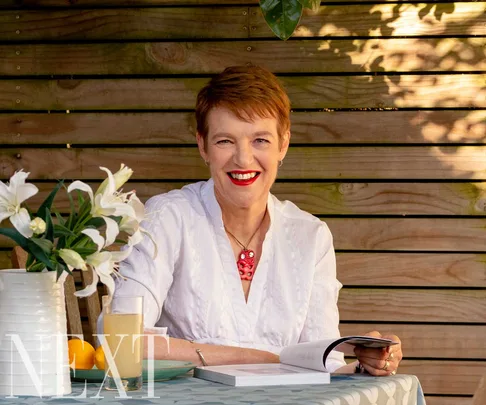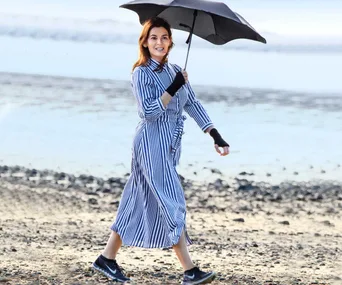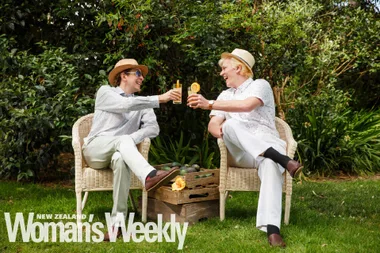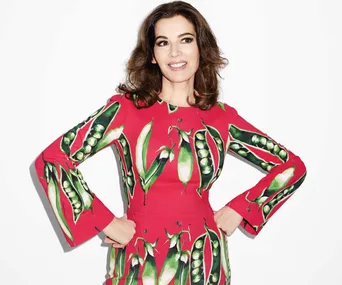Courage and love, and how often one is needed for the other to survive, that is what has been on Joanne Drayton’s mind a lot recently.
Joanne is a biographer, best known for being the author of bestselling The Search for Anne Perry, about the infamous Parker-Hulme murder case. Her most recent book has taken her into equally fascinating territory, chronicling the life and times of celebrity cooking duo Hudson & Halls.
Anyone who watched television during the 70s or 80s will remember Peter Hudson and David Halls with their hit shows.
Recently a theatre production about them has introduced the pair to a younger audience. Flamboyant and funny, they brought New Zealanders a fancier style of food we hadn’t encountered before. But arguably the most interesting thing about them wasn’t their recipes for sweet avocado pie or frosted cheese mould. It was the fact they were a gay couple, appearing together on national television, at a time when it was still illegal to be homosexual.
During her teen years in Christchurch, Joanne watched the show along with much of the rest of the country. “I’m sure I did register they were gay,” she says.
“But also in the back of my mind I wondered if maybe they just lived together or were flatting. Since they didn’t confirm or deny it, people had to suspend their judgement. For me, it was an unknown.”
There was a far more significant unknown in Joanne’s life at the time. Gradually she was becoming aware she wasn’t quite the same as other girls her age. There was something indefinably different about her.
“I wanted to be what everyone else was. So I don’t think I constructed it as being gay. And, if I did, then the idea rushed through my mind fleetingly and I’d think, ‘No, that can’t be right’, because it was too scary, too big a thing and I didn’t want to dwell on it.”
Joanne’s father had brought her up to believe the proper way of things was for women to marry men. “He was quite fixated on the idea that if women didn’t get married there was something fundamentally wrong with them,” she explains.
“The relationship with a man was something that made you acceptable in the world and women who didn’t do that were in some way inferior. I didn’t want to be inferior.”
By the time she was 22 Joanne was married to a man who was training to be an Anglican minister. She was a virgin until after their wedding. Within a few years they had two sons, Andrew and Jeremy.
“It seemed like the beginning of a normal, average life, which was just what I wanted, until I got it.”
Joanne loved her children and was reasonably compatible with her husband. Both were religious, with values you could perhaps describe as old-fashioned. So it took a long time for her to admit there was something wrong.
“It was a slow dawning,” she says.
“I’d got so deeply into marriage and the church, and an image of myself that was in many respects who I was, but not completely. It’s like when you almost tell the truth but a crucial piece is missing. The trigger for me was sitting in a church situation with a vicar who was conducting his life as a gay man as well as being married, and me feeling what a huge piece of hypocrisy that was.
“Then I looked at myself – I wasn’t having an affair, I wasn’t playing around – but I didn’t respect what that man was doing and it was just a little bit too close to what I was doing for comfort. I sat with that feeling for a long time.
My children were young and I was so far into that life, so deeply into it, that jumping out was too complicated.”
There were intense, very meaningful relationships with other women but never anything physical because the idea of cheating on her husband went against everything Joanne believed in. “It seemed like a crazy, catastrophic thing to do and a huge betrayal.”
Then she met artist Sue Vincent Marshall, also a mother of two, at the University of Canterbury while she was doing a PhD in history and Sue was studying fine art. That was the catalyst for Joanne’s life to change.
“But not quickly, I rarely do anything quickly because I’m not a risk taker and I desperately wanted a simple, uncomplicated life. All that emotional stuff you bring into your life is very close to torture and I didn’t want that. But in the end, I was much more tortured than anyone could imagine.”
Sometimes in life you do things you can’t forgive yourself for, but you still wouldn’t change, even if you had the chance.
While Joanne regrets what she still considers the “profound betrayal” of having an affair, and the pain it brought her family when she chose to leave her husband, she could never feel sorry about her love for Sue or the 27 years they have had together.

Joanne found love and support with Sue, and they have been together for 27 years.
“I knew that no one other than Sue would come along that I’d feel that way about. I thought if I miss this, then there will never be another one. In some ways
I had something profoundly missing inside and she was what made me whole.”
Joanne was 33 when she broke up her family. She describes it as catastrophic, a time of grief as much as love. Both she and Sue lost friends when they got together, but for Joanne the hardest loss of all was of a child – her eldest son Andrew who she says couldn’t forgive her.
“I haven’t seen him for 22 years now. It’s a loss that’s so profound, it feels like a lifetime sentence.”
There are grandchildren Joanne has never met and, while it casts a long shadow over her life, she has tried to find acceptance of a situation she can’t change.
“I chose not to continue living with my ex-husband and created a lot of havoc for him and our children. That was my choice and I pushed that on people.
And so I have to live with other people’s choices. That’s the way life goes.”
Today at 60, Joanne shares a life with Sue in Auckland. They have had a civil union and a marriage, and there is no hiding who they are any more. It was in
the early years, when their children were younger, that they had to compromise.
“We couldn’t hold hands, we couldn’t show our affection in front of the kids really because they had been brought up in heterosexual households and we didn’t think they could handle it,” says Joanne.
There were family issues too. She recalls a holiday in Golden Bay, staying with her father.
“He gave us a list of things we were and weren’t allowed to do, written on the back of a Weet-Bix packet. We weren’t allowed to hold hands on the beach, weren’t allowed to do this and that, a whole list.”
Joanne’s experience of having a same-sex relationship that has survived and thrived despite everything, was what drew her to delve into the extraordinary story of Peter Hudson and David Halls.
The resulting book Hudson & Halls: The Food of Love is an entertaining read that tells of wild partying, excess drinking, dizzying highs and terrible lows. But mostly it’s a story about two men who couldn’t live without each other, a story of love and courage.
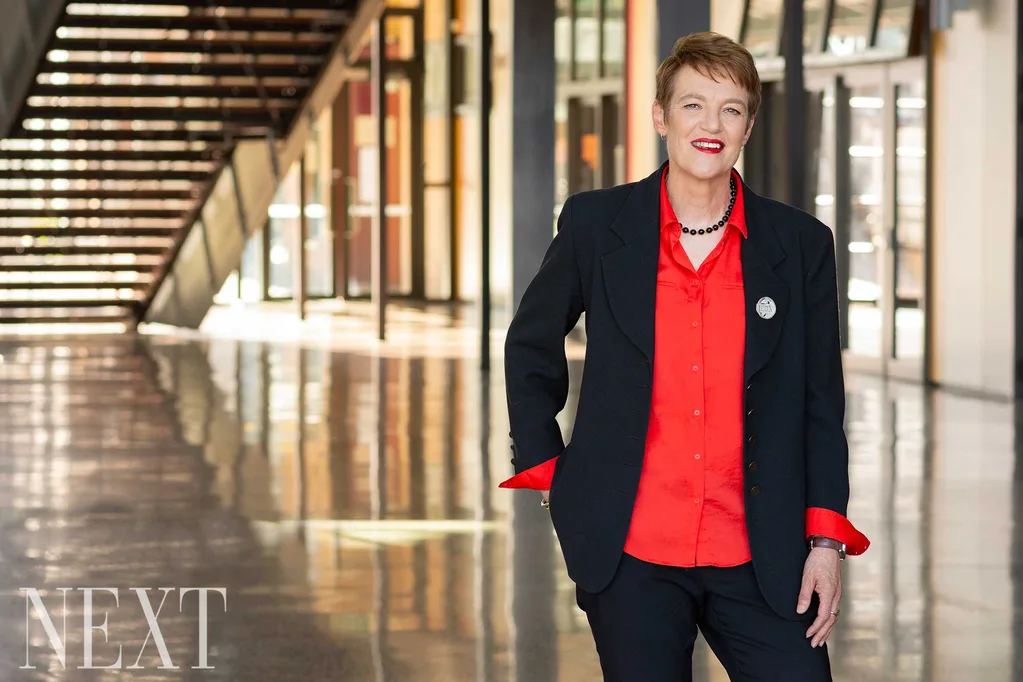
Since Joanne has a full-time job as an English teacher, she relied on Sue’s help to research the book. It was Sue who tracked down an address for David’s
sister, an early breakthrough. And it was her partner who urged Joanne to apply for a fellowship at the Carey Institute in the US, which freed up time to work on it.
To complete the book Joanne developed an unusual way of writing. She scrawled longhand in a series of tiny notebooks while walking to and from her work at Avondale College.
“It takes me two-and-a-half hours to walk there and back,” she says. “I’ve written with an umbrella up, carrying a handful of notes and sometimes I did it with a coffee. There were days I’d leave work and decide I wasn’t going to write because I was shattered, but I’d have the pad in my hand to finish off a sentence and once I started it would fall on the page as I put one foot in front of the other. I had to type it out pretty quickly when I got home because, far out, you should see the scribble!”
Joanne is also an artist and currently in the midst of carving a series of chess pieces based on her and Sue’s heritage. There are plans for more books and she is particularly keen on writing a history of New Zealand magazine, The Listener.
She’s the hyperactive one, the extrovert, while Sue is calmer and more reserved. Still just like Hudson and Halls, neither one of them can imagine living without the other.
“Ours is a love that has matured,” says Joanne. “It’s been tempered by a lot of difficulty and hardship. But Sue is the person I could spend any amount of time with, and that time is not enough.
“Everyday I’m grateful and I can’t say I regret it. I’m sad about the consequences but I wouldn’t even begin to think that.”
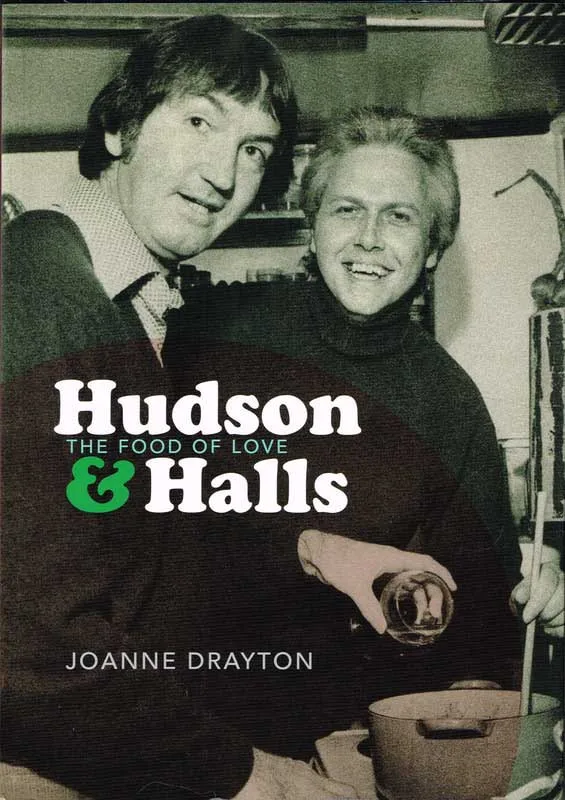
Hudson & Halls: The Food of Love by Joanne Drayton (Otago University Press, $50) is available now where all good books are sold.
